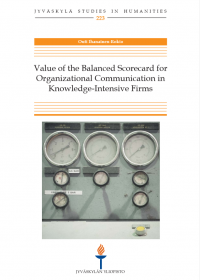
Computer File
Value of the Balanced Scorecard for Organizational Communication in Knowledge-Intensive Firms
This doctoral thesis studies the communication of strategy in knowledgeintensive firms. The research approaches organizational communication in knowledge-intensive work from the perspective of the knowledge worker. The thesis focuses on the management system called the Balanced Scorecard and asks whether or not this management system is an effective model of communicating the strategy in knowledge-intensive firms. As a widely used, modern management system, the Balanced Scorecard has appealed to both practitioners and scholars of strategic management. However, organizational communication research on the Balanced Scorecard remains scant.
This qualitative research is based on semi-structured interviews of knowledge workers in each firm. Research setting consists of four case companies operating in the Finnish ICT sector. Two of the firms are using the Balanced Scorecard as their management system. Using thematic analysis, the data is compared against four value propositions for organizational communication derived from the Balanced Scorecard discourse. A cross-case analysis is done to answer the more generic research question on what the effective communication of strategy actually is in knowledge-intensive firms. The results show that the Balanced Scorecard emphasizes the organizational communication of the company’s vision and mission. However, there are no indications that the Balanced Scorecard supports organizational communication related to learning at work. Thus the communicational value of the Balanced Scorecard for knowledge work remains thin. This study reveals the close and deep connection between the knowledge worker and his or her customer. For the strategic management of the firm, this relationship was not fully operationalized in these studied case companies. Furthermore, a key finding is that in knowledge work, organizational communication that strengthens the strategic management of the firm requires the actions of building trust, enabling learning, and utilizing both soft and hard worker control mechanisms. For organizational communication scholars, this thesis reveals the paradoxical nature of knowledge work and thus points out the need for further study of the management paradigms behind the prevailing communication practices.
Ketersediaan
| E00014 | My Library | Tersedia |
Informasi Detail
- Judul Seri
-
-
- No. Panggil
-
658.45 IHA v
- Penerbit
- Jyväskylä : University of Jyväskylä., 2014
- Deskripsi Fisik
-
254 pages : illustration , cm.
- Bahasa
-
English
- ISBN/ISSN
-
9789513955700
- Klasifikasi
-
658.45
- Tipe Isi
-
text
- Tipe Media
-
computer
- Tipe Pembawa
-
other (computer)
- Edisi
-
-
- Subjek
- Info Detail Spesifik
-
-
- Pernyataan Tanggungjawab
-
-
Versi lain/terkait
Tidak tersedia versi lain
Komentar
Anda harus masuk sebelum memberikan komentar
 Karya Umum
Karya Umum  Filsafat
Filsafat  Agama
Agama  Ilmu-ilmu Sosial
Ilmu-ilmu Sosial  Bahasa
Bahasa  Ilmu-ilmu Murni
Ilmu-ilmu Murni  Ilmu-ilmu Terapan
Ilmu-ilmu Terapan  Kesenian, Hiburan, dan Olahraga
Kesenian, Hiburan, dan Olahraga  Kesusastraan
Kesusastraan  Geografi dan Sejarah
Geografi dan Sejarah  E-Book
E-Book